When it comes to speed over water vs Speed over ground, many of us get confused. May be, it is a confusing topic. What do you feel ?
And the confusion is not only what is the difference but also where and when these are used ? Why we need to have input of speed over water in radar ? Why do we have doppler log on board ? And many more questions like these.
So today i want to put all these doubt and confusions to rest once for all. But before i start, I need you to ask yourself this question. Do you know the answers of questions I asked above ?
Let’s test it. Can you tell what is the speed over ground and speed over water in these three conditions ?
Condition A: No wind, no current, absolute ideal conditions. The GPS speed of the ship is 15 Knots.
Condition B: All other conditions being same but now we have 2 knots current from ahead. What will be speed over water and over ground in this case ?
Condition C: All other conditions being same but now we have 2 knots current from astern. What will be speed over water and over ground in this case ?
Write down your answers. Tick tick….Tick tick.
Ok, I hope you have your answers. If your answers for speed over water for all the three conditions is same, most likely you have got it. But if you have different speed of water for all three conditions, you must read on.
Speed.. What it is ??
There is nothing absolute in this world. Everything is relative to something. Speed too is measured with respect to something adjacent. While travelling on a train you might feel increase in speed when another train passes on opposite direction. Or Sometime on railway station, we suddenly feel our train moving even when it is other train adjacent to ours which has just started moving.
So what is the speed of your train in this case. You may say zero but I may disagree. Depends on with respect to what we are talking about ?
Speed with respect to station will be zero, but with respect to other train will be equal to the speed of that train.
In the same way, the ship’s speed is either measured with respect to water or ground.
Speed Through water & Speed over ground
Speed over water is the distance traveled in one hour with respect to water. Similarly speed over ground is the distance traveled in one hour with respect to ground. Now what does that mean ?
Let us understand this and look for the answers of our three conditions. Imagine your ship is moving from an island and there is a floating boat near to the island. Sea conditions are perfect with no wind and current and your ship’s GPS is showing speed of 15 knots.
In one hour you would have covered 15 NMs with respect to island as well as floating boat. This is because the boat would have maintained its position as there is no wind/current.
So in Condition A, speed over ground and speed over water will be 15 knots.
Now as in Condition B, rest of the things being same, we have 2 knots current from ahead. In this case ship would only cover 13 NM in one hour because of adverse current. So when measured from island, vessel has only moved 13 NM. So the speed over ground will be 13 Knots.
Because of 2 Knots current, the boat would move 2 NM away from the ship. The distance covered by ship with respect to floating boat will be 15 knots. So the speed over water will still be 15 knots.
Now finally let’s assume that there is 2 Knots current from astern as in condition C. In this case ship would cover 17 NM in one hour because of favorable current. So when measured from island, vessel has moved 17 NM. So the speed over ground will be 17 Knots.
But because of 2 Knots current, the boat would move 2 NM in the direction of the ship. The distance covered by ship with respect to floating boat will still be 15 knots. So the speed over water will still be 15 knots.
What were your answers ??
Interpretation of Speed Through water
As you would have noticed, current has nothing to do with speed over water. Irrespective of how much current you have, the speed over water will remain same.
How can we use this information ? Let’s see.
Speed through water for collision avoidance
If you have been sailing on tankers you would already know how much emphasis vetting inspections put on this fact. They want us to use speed over water in radars for collision avoidance. Do you know why ?
To understand this, let me give you a situation. I know many of us are fed up with ROR situations during competency exams but this one would be interesting.
Your vessel is moving on a true course of 000 Deg. You have another vessel right ahead on a course of 180 Deg. There is strong easterly current and because of that your vessel is making good a course of 040 Deg. Other Vessel is making good a course of 140 Deg.
Your radar screen would look something like this.
If there is risk of collision, what action you will take and under which rule ?
If you think you would take action as per crossing situation, you would be wrong. Collision avoidance rules and situations are based on how we see the ship and not on how they are moving.
For example, as per ROR, Head on situation is when you see a ship right ahead or nearly right ahead. That is when you can see both her Mast headlights in line or nearly in line and both of her sidelights.
Now Just visualise the situation I described. Will the defination of head on situation fit in this situation ? Yes it would.
But the problem is that if you follow just the radar, It will give you a false sign that the situation is a crossing situation. This is because the radar would be showing the course made good of both the ships.
This problem is tackled by using the speed over water in Radar. And that is the reason vetting companies require use of speed over water for collision avoidance.
When we use speed over water the same situation would look as a head on situation. That is because when we use speed over water, it does not consider the effect of current on the vessel.
But in both the cases, CPA and TCPA would not change. That is because CPA and TCPA are calculated with range and bearing of the target between two or more intervals. Remember Radar plotting techniques ??
Is the GPS speed required in RADAR ?
There is no debate that GPS feed is required in Radars for position. But if we have to use speed over water in radar, do we require GPS speed then ?
Yes, we do. Infact i have come across some vetting inspector who ask to put the radar on standby. They then check what source of speed it is showing. If it shows GPS speed, they have an observation such as..
“Vessel did not use speed over water while approaching the present port as was evidenced from the radar screen in standby mode.”
In my view, this is really incorrect observation. Navigators need to use both speed over water as well as speed over ground judiciously. Speed over water is only required to be used for collision avoidance and not necessarily for navigation.
By using speed over ground, a navigator is more aware of the situation than otherwise. For example, if the ship is drifting towards a danger, navigator will know it better if he has speed over ground in radar. This is because, with speed over ground radar will show a vector of course made good. (Vector need to be selected as true in this case).
As you can see in above, with speed over water navigator may get an impression that ship is moving clear of the danger. In actual it may be drifting towards the danger.
So Navigators should use both the speed to their benefit and as a tool to better navigation.
Log speed as Engine Speed
As we have seen, current has no effect on the log speed. For this reason, in normal wind force, log speed is very close to the engine speed.
Engine speed is calculated by Propeller distance divided by the time. Propeller distance is obtained by multiplying total revolution to a constant. This constant is proportional to the pitch of the propeller.
So
Engine speed = (total revs x constant) / Time
In normal wind conditions, this engine speed will be equal to the speed over water (or speed obtained from log).
If it is usually not same on you ship, there are few important conclusions that can be drawn.
1. Log is erratic
This can be a good indication of you log giving erratic readings. The conclusion however need to be verified with other means too. These include comparison with the GPS speed in calm weather with no current.
2. Foul Hull
There is another conclusion that can drawn from the difference in actual engine speed and log speed. There are chances of hull having considerable amount of marine growth. This will increase the resistance to the ship and ship’s speed over water will reduce to that with the clean hull.
This can give considerable difference in engine speed and speed over water. There is another way to confirm this finding. If the hull is fouled, ship may not be able to run on NCR rpm because of excessive torque. In run on NCR with foul hull, it is very likely that you will get torque limit alarm on the engine.
Conclusion
Speed over water and speed over ground are two distinct tool. One does not replace other. Navigator should make full use of these speeds where these best fit.
For example, navigator should use speed over water for collision avoidance. Speed over ground should be used for navigation.
Using speed over water, a navigator can be sure of his assessment of colreg situation. Using speed over ground can give an early signs if the ship is drifting towards a danger.
Share this:

About Capt Rajeev Jassal
Capt. Rajeev Jassal has sailed for over 24 years mainly on crude oil, product and chemical tankers. He holds MBA in shipping & Logistics degree from London. He has done extensive research on quantitatively measuring Safety culture onboard and safety climate ashore which he believes is the most important element for safer shipping.
Search Blog
245 Comments


Very good explanation about SOG n STW. Very informative sir.... !!! This is the 2nd blog i hv read from u sir.. last one being on ECDIS.. thnx.. awaiting many more such blogs frm u !!!!!...

Thanks for reading Mradul... And yes many more blogs will be coming your way..keep reading

Thank you sir, it was very informative and was in simple explanation

Sir, can u plz give some info what does a vetting ins.expect from 2nd officer on a paperless ship.what all ques he mighg ask. I am just promotted to 2nd and next port going to have vetting inp of shell.

You should how to do everything on ECDIS that you do on paper charts. For example marking of parallel indexing, Abort point, contingency anchorages etc. Apart from that how to correct ENCs and how to plot Nav warnings & Navtej warnings on ECDIS. There are couple of post that I have written on ECDIS, you can also go through that. If you have any specific question, don't hesitate to ask me. All the best Sourav..

v.good and thanks

Glad you liked it king

Sir i wanted to know, even if ship is stationary the log will show some speed and log gives speed through water,!

When the ship is moored, ship's log still can show some speed for example if the ship is moored in river with current. Log gives STW but modern doppler logs are also capable of showing SOG.

Excuse me , but you sayd that current is not influencing the STW! You said speed log is reading the speed acording the pitch of the propellers!

That is when ship is not moored or anchored. If the ship is moored or anchored it becomes other way around.

Really excellent sir. after being three years at sea,im well clear now. thank u soo much. great effor. keep posting more.

Happy that it helped you Karthick. Let me know if I can be of any help anytime.

An infomative article in a very simple and lucid manner.Thankyou very much captain.Hope to get more fantastic surprises like this from you.Shiva bless you

Happy that you like it Gautam..

Great explanation in an simplest way possible! Really appreciate your efforts

Happy to help Rohan.. Let me know if I can be of any other help anytime

Nice n simple explanation.....looking forward for use of Parallel indexing... And sir kindly reply in mail if possible

Glad you found it useful Abinash..Sorry but I didn't receive any email. You can contact me Through contact section in the top menu..

1: In all my life I never heard before of speed OVER water? did you mean speed THROUGH the water, Sir? 2: in the examples you made, you talk of GPS speed reading. Well, according to the majority of seafarers out there, the GPS will give you ALWAYS a SOG and not a STW, which is instead what the Log will give you..... Just those 2 things let me realize I lost 10 minutes of my life reading this "article". Regards.

Speed over water and speed through water are one and the same thing and I have heard both terms being used by many people. I am sorry to have you given an impression that GPS speed is speed though water but I am not sure why you got that impression as I referred GPS as speed over ground.

I think the three cases you illustrate give an impression that the GPS always measured 15kn, which happens to be speed over water in those examples.

Just to clarify, since you do not explicitly state GPS speeds in cases B and C, that probably gave the impression of GPS measuring speed over water. I think you may clarify that speed over water in all cases remains constant, and then ask what GPS reading will be. That will be clearer in my opinion. It will illustrate more clearly how speed over ground is affected by currents given constant speed over water.

Thanks Aditya.. That may have caused the confusion for Druvil but I think most of the reader (including yourself) got it that GPS speed was mentioned just for the reference in the first example. I will think over it again how i can remove this confusion. Thanks once again for suggesting this..

I was in the same situation. I got confused by the way you introduced the speed in the 3 examples. It does seem that you are talking about a constant SOG of 15NMs and we have to figure out what would be the SOW for the three situation. If you have no clue about either it leads to confusion as it makes you think that it is the SOW that will change and not the SOG. Someone that knows a little bit about it will pass by it but someone that is not so well versed in Naval Nav will be left confused and might just stop reading. Here is a suggestion on how it would help alleviate the confusion: Condition A: No wind, no current, absolute ideal conditions. The GPS speed of the ship is 15 Knots and Log Speed indicate 15 Knots. Now Condition B: how would a current of 2 knots from ahead affect the SOG and the SOW? Then you ask the opposite type of current followed by : It might surprise you if you are new to Naval Nav but it is the SOG that will be affected. The SOW is the one that will stay constant. Here is why... then you carry on with your very well structured explanation of the both speeds and their difference. I know it is pretty much late ( Almost a year after you posted) but know that I just search this topic and your article was first on my google search. Thank you for the help cheers !

Why would a reader think that GPS speed is only for the first A example? When B specifically states "All other conditions being same but now we have 2 knots current from ahead." So if B has ALL the same as A which states "No wind, no current, absolute ideal conditions. The GPS speed of the ship is 15 Knots." that would mean GPS speed of 15 knots ... which is always over ground. Yet your answer for B gives the wrong amounts. That is confusing and wrong. B should be with GPS speed of 15 knots, SOW of 13 knots (15 STW - 2 knot current) and SOG of 15 knots (same as GPS speed as that IS what its telling you). IF you want the other examples not to include GPS speed, then it should not state conditions are all the same. OR in condition A it should put the GPS speed as a question. For example "What would be the SOW and SOG if GPS speed is 15 knots?" Phrased that way, that is a question to answer condition A, and no longer part of an ALL conditions of A.

Possibly you will loose the rest of your life if you don't read it again.

Hello Captain, thank you for your lesson which i can't even get in my institute. I have a question by the way. For the collision example, if i observe visually when 2 ships are in sight, there will be a crossing situation right?

No Henry.. if you are on one of the ship and when you observe other vessel, you will be able to see the vessel head on with both masthead lights in line.. Both the ships will be facing head on but will be moving in the line of their course made good. Hope that clarifies

Thanks for providing the very good tricks to us.It is very useful for getting results in SERP. real estate agency, real estate agent

Officers get easily confused when port state comes with such questions.. Hope you will post more of these stuff. And the figurative explanations are much more understandable than plain notes on these..

Happy that you liked it Christin.. I will be posting more of these in near future.. Thanks for reading.

Thanks for providing the very good tricks to us.It is very useful for getting results in SERP. real estate agency, real estate agent

awesome blog sir....it washed away my lots of confusions....u have explained it in such a easy language..which made it so easy to understand...

Glad that I could be of some help to you Mithilesh..

Dear sir,thank u for an easy n much useful explanation.Very well n clearly explained.Hats off to u.

Glad that you found it useful Taufiq..

Sir I have asked many people about the same qustion but I ddnt get a good ans.. after reading this my all doubts cleared. Thanks sir

Glad that it could clear some of your doubts Jino. Let me know if you have any question anytime..

Thank you sir for nice explanation

Glad you liked it Vivek...

This article is so good! Great great refreshment for memory! Thanks a ton cap!

Happy that you liked it Utkarsh..

Very practical explanation wd more relevent examples.....thank you sir.....its very helpful:):)

Glad you found it helpful Aditya..

Excellent explanation.

Thanks Vincent...

An excellent & simple explanation. Very well written & illustrated.

Glad you liked it Clinton..

I am sure, all of us are heading for a better future of mariners. Thank u for your efforts.

Together we will make sure better future of Mariners Gurpreet..

Thanks for the post. May I share it?

In fact I will be obliged if you can share the link Cecilio..Thanks.

I smell a subramaniam in you, Great explanation. I never going to confuse this now onwards

Thanks Abin for your kind words.. Glad it could be of some help to you..

Thanks Capt.

Thanks for reading Levon..

sir very useful, great explanation and explaining abilty. you make coplicated topics to understand very easily.

Thank you Jitendra.. Happy that you found it useful..

Hi, thanks for the explanation, it was very helpful. I would like to know if this blog is still working, Could not find new tops on it. Thx!!

There are many blogs that I have posted after this Gilson. You can visit the list by clicking "Blog" on top of this page. Or you can go to www.myseatime.com/blog . If you still cannot view it, let me know. I will get it sorted out.

Thanks Sir for such a simple explanation.Sir,can you please tell me what is the difference between Log Speed and Observed Speed.How do we determine these two.Also which one of these are to be considered for calculating the fuel consumption or the Power.Thanks in advance.

The power and fuel consumption is not calculated by the the speed. Log speed is the speed made through water and observed speed we refer to the distance made between point A and B. Observed speed could be different from GPS speed because we might have done few alterations to avoid traffic and would not have proceeded directly from point A to point B. So observed speed is the effective speed made by the vessel.

i like your blog Mr. Rajeev indeed its helpful. Id like to ask you something, about T&P for Jeppesen C-map, it seems it doesn't show the visualization of T&P unless you have list of T&P from NTM.

Yes, Infact T&Ps through AIO only shows the affected area and T&P number which user need to view the information by going to the properties. UKHO is trying hard to come out with a better way to display T&Ps. Till that time we have to live with it. It would be a good practice to keep the print outs of the T&Ps affecting voyage ENCs and keep near the ECDIS for the watch keepers to refer quickly.

Thanks a lot......u did a great job...dont know...how to thank you...please tell me diff btwn underway and making way....waiting eagerly for more interesting stuffs from your blog

Underway is when ship is afloat but not at anchor or at berth and not using engine. Making way is when vessel is making way through water and using engines.

Hello, can clear a doubt for me ?, when we speak about SOG and we need instant SOG, for example in anchoring, which source is best, GPS or doppler speed log ? I think Doppler speed log is best for being instantaneous, and GPS needs to compare between 2 positions and maybe one of them is not so good to be consider for this purpose....Am I right ? thanks a lot

Nicolas.. Doppler does not give SOG. Doppler gives speed through water. Also GPS speed is good and accurate and we can use it during anchoring also.

Excuse me Sir but you can select in some doppler speed logs STW or SOG, obviously when sea bottom is available, next is an extract for a manufacter brochure : " The Doppler speed log measures a vessel's speed through the water or over the seabed ". I personally remembered this function onboard. Thanks anyway, very good article

I worked on doppler log which had the option of STW and SOG but SOG was taken from the GPS feed but I never came across Doppler log which could also measure SOG. Thanks for that feedback. But coming to your original question, we still can use GPS speed during anchoring.

good information sir , you might think the equipment is working by itself and there is cross check but it is being feeding by the other, better to follow the input signal to find where they go...thanks

you dont understand dopler speed log operation principle

Superb explanation, was never so easy to learn. kindly comment on underway and making way.Thanks

Glad you liked it Shushant. Next post in line will discuss the difference between underway and making way.. Hope you will find that helpful.

Amazing explanation sir. Will ARPA calculate different CPA for SOG and STW ? Which will be the accurate CPA ?

ARPA will show same CPA and TCPA with both the speeds. Both will show exactly same CPA & TCPA

Awesomeee explanation sir..... Now my doubt abt sog and sow is totally cleared. Thnxs for sharing such wonderful information sir.

Glad you found it useful Saba..

Thanks capt for taking the pain to gain us

Happy to help Gulbag..

Very good job! thanks

Thank you so much for your kind words Sir..

Good Day Sir! I would like to ask some question regarding this matter. You made a real good point in using the speed over water to determine the situation of both vessel if it is crossing or head on situation which is right. Now that you have determine the situation and apply the maneuver should you maintain using SOW or should you use SOG?

Once you know the situation, all you want to know is CPA & TCPA. Both speeds will give same CPA/TCPA so it does not matter which speed you use for that.

Awesomeee explanation sir. But I still have a doubt about how an instant STW measured by doppler log is affected by a current from ahead. If the vessel's speed is 10kn and the current from ahead is 2kn, the speed (if no current) would be 12kn? And the SOG would be same 12kn?

Hector, the doppler speed is not affected by the current. It does not matter how much the current is, doppler speed (STW) will be same because of its principle of operation.

Thank you very much sir, long time I had been seeking the suitable explanation on this important topic. Really very helpful.

Glad you found it useful Harmanpreet..

This is the best explanation of STW and SOG that all Masters, Officers and Cadets should read. Appreciate your effort and time on this writing.

Thank you for your kind words Jack..

Capt.Sab this is the 2nd blog I have read, the explanation with examples made interesting,really very practical approach in explaining keeping in mind all ranks. Very clear on Sog and sow.

Thanks Kadali..

a doubt: Does anywhere in RoR or as per IMO is given to use STW for coll avoidance? also how to explain that RoR is based on aspect? like heading of the vsl? thanks in advance

No.. It is not mentioned in RoR that speed through water to be used for collision avoidance. But it is rightly implied so by oil majors and by the industry experts. This is the main reason why we have feed of speed log in RADARS. During SIRE inspections on tankers, it is checked by the inspector if the ships are using STW. ROR is based on aspect because all the definitions of situation like Head on and overtaking etc are as per the aspect of the vessels and not how the two vessel are moving.

Superb explanation sir. It's very easy to understand and gives thorough understanding of the subject.

Glad you found it useful Swapnil..

I found very useful of your blog. i still have i more questions, what meant by sea stabilized and ground stabilized in radar setting? Thank you so much.

Glad you found it useful Andy. Sea stabilised Radar is when we use log speed (speed through water) in the radar. Ground stabilised Radar is when we use GPS speed (speed over ground) in the radar.

Hi sir, so can I just safely say that STW is equal to engine speed based on the RPM given?

In ideal condition..Yes but the difference will be if any speed reduction due to foul hull or due to high wind.

Somethings in doubt, my ship's doppler logs have a 'bottom lock' function when UKC is less, it means the doppler log will not provide STW to APRA, If APRA are setting to true motion radar display, what problem will come out ?

In this case as the ARPA will have SOG, even if the radar is set to true motion, the targets will be shown moving along their course made good. We still will not have the aspect of the vessel on radar on which ROR is based.

You're very thorough sir. Excellent interpretation. Very uselful

Glad you found it useful Ian..

GREAT EXPLANATION SIR, SINCERELY APPRECIATE YOUR EFFORT FOR FELLOW MARINERS!!

Thanks Nivas..

Very good explanation

Thanks Rajesh..

Very informative article, all laid out on shelves and extremely affordable explanation. Thank you!!!!

Thanks Vasyl...

Sir,i dont know you.But the way u explained the stuff really appreciable and helpfull.

Nice to hear that Nirmal...

u made this concept looked so simple....short and simple..now i can explain anybody abt this concept

Thank you Rakesh.. Let me know if you have any doubts on any other topic..

hi sir, What about the Doppler Log in Bottom Tracking Mode, is it also unaffected by set and drift?

Few Doppler logs can measure the speed over ground by "Bottom tracking mode". As this is speed over ground, it will be affected by current..

Thank you sir well understood! have you wrote any article on Auto Pilot systems. I've doubts in the Alarms especially with the Tokyo Keiki Systems 1)pilot watch alarm, 2)Heading monitor, 3)Off course Alarm ?

I haven't written yet on Auto pilot but I will surely consider writing on that..

Understood sir, you're blog is really helpful!

Thanks Nish..

Sr it was very helpful but in shallow area from which log on ship gives us stw???,that time doppler will be giving us sog na sir

Doppler log wil still give the Speed through water..In some Doppler log, it can additionally measure speed over ground too..

Hi Rajeev went through your blog,Excellent the explanation was simple and clear. Further i wish to work on Safety culture ............need to discuss further. My email ID is smrviv@yahoo.co.in.

Thanks Capt Vivek.. Will get in touch..

Thanks

Many thanks Sir,Your explanation very clear and helpful.Good info for mariners.

Glad you found it Helpful Paulus..

Great job sir my concept is clear on this point. Thanks a lot

Glad to hear that Brajesh..

Thank you Sir for the simple and effective explanation. I am going for my mates orals in a couple of weeks and am a bit confused regarding the stabilisation display on a RADAR. How to identify by viewing a PPI if the stabilisation mode is sea stabilized or ground stabilized with an aid of a picture for better understanding. Thanks in advance.

Hi Rajeev. If I get it correct, the reason why STW is preferred against SOG for collision avoidance is because it makes it more easy to define which RoR should apply to a situation and has to do nothing with the accuracy of both ways?

Absolutely Angelos.. With both the speeds, there is no change in CPA, TCPA..

Hi again and thanks for clearing things out. That article was really a relief since it explained all that someone needs to know on that issue. It is always very important to satisfactory explain to people "why" they need to do something in order to convince them do it even while you look the other way and your article does exactly that. Thanks again.

I still dont understand one thing - how Dopller measures STW in shallow water. The signals should reach bottom so this is automatically SOG?

No Frank. The doppler measures the speed through water by doppler effect which measures the shift in rays from the direction it is transmitted. The doppler shift exists and is measured in shallow waters too..

Thx Rajeev for clarification

You're Welcome Franc..

sir , when we navigating in coastal waters we have to use SOG OR STW

We have to use both as both gives us information that may be helpful for safer navigation. As I pointed out, STW is to be used for collision avoidance as it allows the radar to show aspect of the vessel. SOG is useful because it gives the "course made good" of own vessel which can be used to know if the vessel is drifting towards a danger.

Beautiful Explanation with Diagram. Had never been so easy all these Days

Glad you found it useful Musthafa...

Sir great explanation by you,thanks i understood what is stw and sog,when we use sog its remain same head on situation but Only the geopraphical postion of collision will differ,my question is that why we are not using sog even in both situation remain head on. Thanks a lot sir.

The best explanation I read on this subject. Thanks . Please share with us more topics. One thing I am interested is plotting a celestial observations on ENC

Sir If you could help me on this...Which speed (SOG / STW) shall be used for squat calculation and why......

Thanks, Sir, I found the answer in your Squat topic. It's really helpful. Appreciate....

Hi Rajeev. A fine article you wrote. Do you know where I can see in the IMO regulations that radar shall have input from log? and how about echo sounder? is the echo sounder mandatory for ECDIS? Kind Regards, Birgir

If I may, Capt. Jassal, I'd like to answer these questions to the best of my ability: 1. With regard to Speed input to Radar, the (IMO) Performance Standard says: "The radar system should be capable of receiving the required input information from speed and distance measuring equipment (SDME)". It also states: "A means of manual speed input should be provided and its use clearly indicated" and "The equipment may be operated with course and speed through the water information." The Standard provides for both - "Ground Stabilization" and "Sea Stabilization" Modes, as follows: Ground Stabilization: Display mode in which speed and course information are referred to the ground, using ground track input data, or Electronic Position Fixing System (EPFS) as reference. Sea Stabilization: Display mode in which speed and course information are referred to the sea, using gyro or equivalent and water speed log input as reference. ECDIS: Mandatory interfaces - Speed, Heading and Position. Everything else is Additional, including the Echo Sounder. Think about it - ECDIS is an anti-grounding tool. Therefore, at any given moment, the equipment 'needs to know' where it is (position), where it is going (heading) and how fast (speed). The Vector (set by the user) projects in the forward direction from the ship and when it touches the 'Safety Contour', the equipment will alarm IN ADVANCE of the vessel crossing the Safety Contour (or Shallow Contour). Now suppose it was mandatory for the Echo Sounder to be similarly interfaced with ECDIS, what purpose would it serve? The Echo Sounder gives depth below vessel (not ahead of it), so it would be too late - a vessel could be aground by then. OOWs need Advance Information of the ship running aground, so really there is no need for Echo Sounder input.

Great article. Please can you provide explanation (difference) between for and aft speed, transverse speed and athwartships speed.

Very useful information sir. So glad to learn from you.

Glad you found it useful Ajay...

Very useful and very clearly explained. Thanks

Thanks Abhishek...

Hi Sir: May you kindly assist me with the following situation, Speed log is required for every vessel 300 GT and over. A Newly built cargo ship , 1500 GT, is required to make a maiden voyage from a new building yard in China to Singapore. As the vessel will only operate within Singapore port limit, applicable regulation does not require her to be fitted with speed log, so it is not provided. we need to request an dispensation from speed log for the maiden voyage, We also need toassess the risks involved during the voyage without speed log and ways to mitigate them. Can you assist me with above Please.? Thanks.

For risk assessment purpose you can include Hazard as “collision because of wrong colregs action based upon Radar with GPS speed only... control measures can be additional look out, actions based on visual spotting of target when possible..bridge team briefing, early action to avoid confusion etc...

Sir, if i am at anchor and have a current of 3 knots ahead my STW and SOG will still be zero, is that correct?

No... SOG will be zero but STW will be 3 knots...

Thank you very much sir now i understand and i understand more after reading your blog the second time.

Question sir, if i am proceeding at 10 knots and having unfavorable current of 10 knots, does this mean my SOG is zero and STW is 10 knots?

Thank You for excellent explanation.

Excellent explanation with proper shipping terms and in a very simple way. Thank you so very much for all your time and efforts.

Hi Captain,

Hello captain, A great and easy explanation for the topic. But then speed through water being taken by the log if used in coastal waters of let's say depth 20-30 mtrs, wouldn't the speed over water and speed over ground be exactly same as in shallow water the echo would reflect from the sea bottom and not from the sea layer in between (as shown by the log in deep waters). In this case the aspect would remain the same and a head would be shown as a crossing situation in radar. Apart from first visually siting the vessel and later using the radar for collision avoidance this would really confuse the oow. Also if a vessel is anchored in a shallow water Anchorage and a current of 3 knots acting from the head but the log again would get the echoes from the sea bottom and would probably show almost 0 speed over water. Could you please clear this doubt and enlighten us on the above situation. Thanks Best regards

I guess it would depend on the equipment you use on board. For example in my ship we use Furuno DS-80. Ship's draft is 7 meters, anchored at Tampico, Mexico with UKC of 15 meters. Doppler shows 0.4 up to 1 knot of water speed/STW which is clearly not SOG because GPS SOG shows 0.1 to 0.2 kts all the time. So clearly, the acoustics transmission of my equipment is designed to pick up speed readings via water mass/elements below transducer.

It would be incredibly helpful if someone could clarify why STW would be 5 knots facing an adverse current on the bow which also has speed of 5 knots? Yes, yes... STW remains the same regardless of current or other environmental forces as opposed to SOG which is affected by tides,wind,current etc. I clearly see the distinction. The theory of a vsl that is drifting downstream on the river with engine off resonates with me, i.e. in this case it would have SOG 5 knots and STW 0 knots given that speed of the current is 5 knots; conversely STW is 5 knots if it is propelling against the current, SOG would be 0. Right. Favorable and adverse weather conditions are applicable just to SOG, I get it. Now... I got it , until I discovered that EM speed LOG as well as Pitometer as well as Doppler ultrasonic LOG... probably there are some others (devices that measure exclusively STW), they all collectively rely upon the movement of the vessel over the sea surface e.g. EM Log on the speed of cunducting seawater flow, PIT log on the dynamic/static pressure caused by the facing water flow and Doppler on transmitted versus returned sound waves/frequences while ship is on the move. The question suggests itself, since STW is not equal to the Engine speed, how come when it is propelling against the current (I suppose it is not moving, and SOG supports this, it is 'zero'), if it is motionless and only thing that is moving is propeller... what kind of speed measuring equipment would show speed 5 Knots stw? Is there any connection between engine speed and STW in this case? The same applies to the vsl at high seas with weather conditions that slows ship down or speed it up... it is physically affected, consequently all the equipment mounted below the waterline should be affected and show affected speed. I realize that engine may produce the same revolutions irrespective of what wind blows or where current runs from... but... ( If STW not related to the rpm of the propeller, how does it stay unaffected by current etc and on top of that shows 5 knots while we are not moving against the stream ? )Please help me to unravel this. I appreciate your time, thank you for reading.

Is speed log mandatory to be connected to ecdis or GPS speed is enough

I just did not understand it, I felt it

I felt it down to my bones.

Thanks sir. Excellent explanation.

Sir by which regulation we use speed through water for collision avoidance

Its a great help there sir, my inquire is our speed log is failed right now which speed is to be input into my Arpa.. How to calculate the manual speed or can I input the speed of the ground to my Arpa? Thanks a lot...

Thanks for your sharing captain..this important for us who have fresh graduated from school....

how good you explain every subject ......its just amazing .....never came across such wonderful blogs anywhere else ....you always keep the things simple .....thanks a lot Capt Rajeev Jassal Sir, For creating Myseatime.

SOW should not be used in RADAR at all as none of these instruments are showing any consistent reading . Collision avoidance in this case must be using the visual means as these rules applicable to vessels in sight of one another , and in the case of poor visbility then a complete set of rules will apply . Many times if you have used SOW then you will find the vectors are never steady as the EM Log or Doppler log has huge variations in s short span of time . In case of Doppler log it may even change to SOG when the depth is low . The aspect is only valuable in vessel sight of one another .The wind drift factor is not even considered in this assumption , the notion that only current will affect is not correct and in low depth areas current may affect differently (places like Singapore straights or coast of Japan etc ) . The SOW water to be only used for collision avoidance is something which requires to be questioned , but sadly in this industry we tend to have some holy things and SOW is one such thing . A common SOG is best for good situation awareness .

Sir, pls help me out if ground stabalised is on priority for coasting, and sea stabalised for collision avoidance and open waters

You are right Anand Raj, we follow Colregs, in any condition of visibilty (Rule 4 till Rule 10), In Sight of one another(Rule 11 till Rule 18) & In Restricted Visibility(Rule 19). So if we taking action action using radar that is in two situation in any condition of visibiltyRule 4 till Rule 10) & In Restricted Visibility(Rule 19), where we should not be worried or taking care about the Ship's Vector shown on Radar. in clear visibility we will take action as per aspects i.e how vessel's headings are in relation to each other and if we using RADAR only then we are not looking out of window then....so .....why should we worry about the Speed input, but the problem is ....Vetting inspectors / PSC / Seniors .....who will explain and convince them....Sorry all ....

I have read until here and this is the comment that I am looking for. Why does nobody discuss this simple fact that you have the aspect already visually by your eyes the most reliable instruments you got. And forget all about STW / SOG.

Awesome, very nice explanation. Concept clear for life time.

Even a civilian can understand, its simply great.

So where does ground stabilized mode and sea stabilized mode apply sir?

Sir I have one question regarding navtex warnings. Most of them are automatically plotted on Ecdis but few doesn't get plotted. Can u please help me out

Dear Capt, in case avoid collision Capt Should not use SPEED THROUGH WATER, it make confusing for reader, i think we should use course over ground and true speed (SOG) for tackle avoid collision problem.

Dear Capt.My query is regarding the speed showed up on doppler log furuno DS-80, while vessel is moored, the STW shows 10 knots!!! Is it a error ? Kindly advice on same.

Sir in short does is it mean that at open waters sea stabalised mode is at priority, and ground stabalised while coasting. Pls correct me sir.

Thanks Rajeev sir informative

Instructions from the Charterers is 14 knots ' speed through water'. What should be our action in this regard. Set the vessel at Engine speed equating to 14 knots using the formula Speed through water = RPM x Prop dia x 60 / 1852 ...... then keep this set. What do we do when we get an adverse current or a favorable current. I am asking this question especially with respect to CHartering of the vessel and speed.

thank you sir, the diagrams that you have given are with true vectors, what would be different scenarios if relative vectors would be used vis a vis sog and sow. and does the ODMCS input come from log speed or gps and what would be the difference in both cases and finally annex 12 kts regulation for discharge cretria is it log or gps speed, awaiting your answer

.thanks sir for this usefull info my dougt are claer regarding STW and SOG

Than you very much for this post Very useful information, however if the GPS speed given at the start is 15 knots so is the SOG in any given situation. Then in the first example STW =17 knots and in 2nd example STW =13 kts? Thanks rgds

Exceelent writeup. In my opinion GPS gives speed madw good in water or on road ....since rate of shift in position decides the speed made good by gps. Thereby gps gives speed made good on water or land

Thanks capt.

Very good information sir...

Respected Sir, Now I'm very clear about STW and SOG thank you sir for making it simple.

Hello Sir, I had vetting inspector which insplained to me that speed through the water is your speed with resistance while speed over the ground is your speed without resistance. Can you please explain to me further sir if this correct? Thanks a lot and looking for your favorable response.

Current is some kind of resistance

Very well explained sir. Can you cover a topic related to radar setup explanation about different modes. Thank you

We offer sanitary ware suppliers in abu dhabi with high quality A clean, comfortable, and well-lighted bathroom can make a substantial difference to one's sense of well-being.

Can marine radar calculate speed by itself?

Good day sir. I have a question regarding this matter. If I use Relative motion display and echo trace, do I still have to use sow for collision avoidance?

Thankyou vry much sir looked like an educated person is writing smthng..looking for more posts sir...

Brief and well explained..Thank you so much for sharing this information..really helps a lot.

Why would a reader get it that GPS speed is only for the first A example? When B specifically states "All other conditions being same but now we have 2 knots current from ahead." This means that B will still have GPS speed of 15 knots, which is over ground. As THAT is what A tells us "No wind, no current, absolute ideal conditions. The GPS speed of the ship is 15 Knots."

10 years in shipping and finally found an explanation worth while..... No Captain has ever explained it in such a simple manner,,, Thanks a lot ,,, Peace finally...

Maybe in the end of the article, is the opposit :"Using speed over water, a navigator can be sure of his assessment of colreg situation. Using speed over ground can give an early signs if the ship is drifting towards a danger". If SOW is for Collision avoidance, and the SOG is for navigation, this end frase is saying just the opposit.

How do I know publication are updated onboard?

Kudos sir. Thank you for explaining so nicely. This was the best way how one can know about the difference between STW and SOG. Dil se thanx.

Absolutely wrong. So the whole reason we shouldn’t SOG for collision avoidance is aspect? What? Who determines aspect based on radar? LOOK OUT OF THE WINDOW. Do not base your judgement on scanty radar information. Ground stabilised radar is superior in most cases

Explenation principally correct, but is completely oblivious to what the GPS measures. GPS measures your position relative to earth however and will therefore always provide speed over ground. However, if the GPS readings in this articel are changed to a measurement reading relative to the water, for example through a pitot-tube, then the math would be correct. /Aerospace engineer

Very nice ???? and good explanation related to the topic. Thanks

Having spent my entire career on the Great Lakes where there generally are no SOG equipment installed due to our operation in very shallow harbors and rivers where the equipment would not survive I now can see what it might be used for. Generally, on the newer radars we are getting SOG was something that needed to be locked out since it might revert to some manual entry that had not been updated and the operator was not cognizant of. With AIS you can determine aspect as well as by the very reliable visual observation. However, I would trust GPS speed much more than anything derived from being in the water especially considering marine growth or other faults that would be unknown to the operator, thus the big push by some State Control authorities seems overdone. Thanks for the clear and simple explanation.

Sir thanks alot for simple explaination.sir can u pls explain what is ground stabalize and sea stabalize

Nice blog sir.....

Sir, very nicely explained . Thanks alot

Only one question please because i am confused . Course through water i see in harpa and course over ground. Please explain with few words the differences

Can someone please explain me the difference between course through water and course over ground ?

Very well explained sir !!!

Captain Rajeev your work on the subject is the best that i found and with your permission i will use it for training purposes. Thank you.

Hi Sir, I really like all your posts. Somehow you have the ability to explain a difficult topic in a simple way. Whereas most lectures in maritime school (both physical and online) are making things more confusing (I think that's because they don't fully understand a particular topic). Please post more or even consider doing YouTube. Best regards from Singapore.

hi sir, when to check from sow to sog any depth requirement or whenever we see coastal

Great enjoyed reading your blog . Please share your E-mail ID to get in touch.

Sir good explanation...

The blog is absolutely fantastic! Lot of great information which can be helpful about benefits of developing website. Keep updating the blogs. custom on-demand app development

Greetings from ukrainian seafarers! Great article and a great webpage in general!

Thank you capt it was of great help.

Nice and detailed explanation,thank you very much.

very good explanation in very simple manner

This is really what I was searching for. I am feeling joyful to came here. I would like to thank you for sharing such info with us, I like to advise you that Keep sharing such ideas in the future as well. Thanks & Regards Steam cleaning service in abu dhabi

Thanks for posting this info. I just want to let you know that I just check out your site and I find it very interesting and informative. I can't wait to read lots of your posts. Thanks & Regards Apartment steam cleaning in abu dhabi

Thanks for posting this info. I just want to let you know that I just check out your site and I find it very interesting and informative. I can't wait to read lots of your posts. Thanks & Regards Deep steam cleaning in abu dhabi

I don't agree with your statement "In normal wind conditions, this engine speed will be equal to the speed over water (or speed obtained from log)". I will never the same even though no wind at all. Pitch is not a foreseen distance travelled through the water when propeller turn one round, rather it is a direct proportion of the pitch angle multiplied by 2 pi and radius of any point along the blade. It is a mathematical 'conversion' from rotational distance to the liniear distance. When it operates on the water, it meets viscous resistence which consists of viscous pressure resistance and friction resistence. It is unfair to judge speed log as erratic in the absence of foul hull. Even a clean hull, the viscous resistance will always there whih makes the propeller less efficient. The faster the propeller rotates, the bigger the resistance which increase the gap between log speed and engine speed (by pitch & rpm)

When we are talking about RADAR use it is true. But modern vessels have ARPA systems. These are used in Nup mode RM(T) and regardless the speed input sensor selected the results are the same. They give the true motion of all vessels and your own vessel. So to my opinion majors first have to understand what is the system the vessel is provided. Two radars and one ARPA system? Or two ARPA systems? Usually its the second configuration. If a surveyor puts an observation like this and vessel has only ARPA systems it means he has no idea what is he looking at

In my first ship, One-day i asked my 2/0, why you put speed through water during SIRE inspection and what's the differences between them? He tried but i couldn’t understand. Today i get it clear.Thanks Sir for your well explanation with suitable example which has made the topic easily understandable.

Capt. Rajeev, Excellent explanation. Thumbs up to you.

It seems to me that in condition B the sped over water will be 17 kn
Leave Comment
More things to do on myseatime
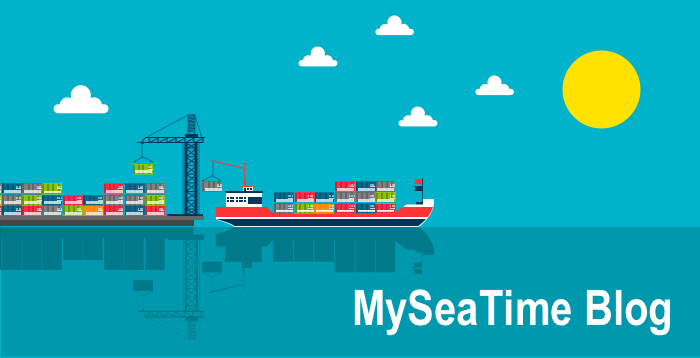
MySeaTime Blogs
Learn the difficult concepts of sailing described in a easy and story-telling way. These detailed and well researched articles provides value reading for all ranks.

Seafarers Question Answers
Ask or answer a question on this forum. Knowledge dies if it remains in our head. Share your knowledge by writing answers to the question

MySeaTime Podcast
This podcast on the maritime matters will provide value to the listeners. Short, crisp and full of value. Stay tuned for this section.

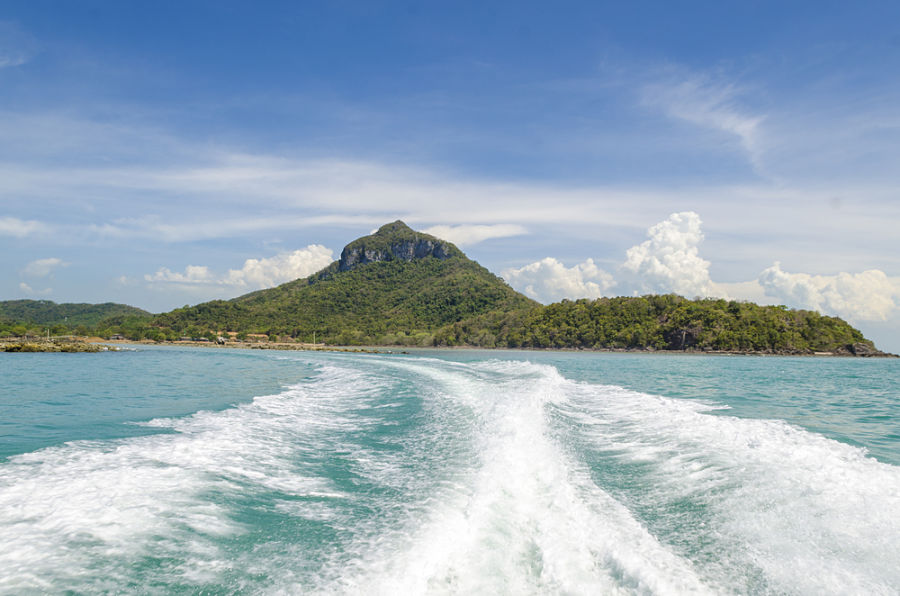

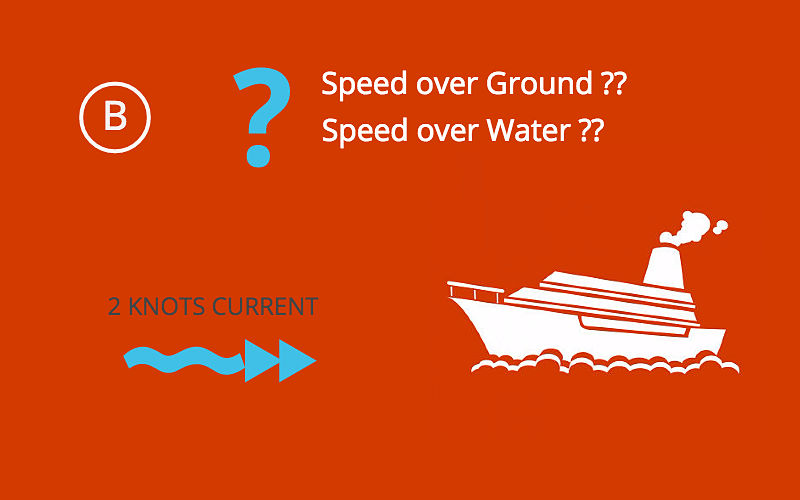
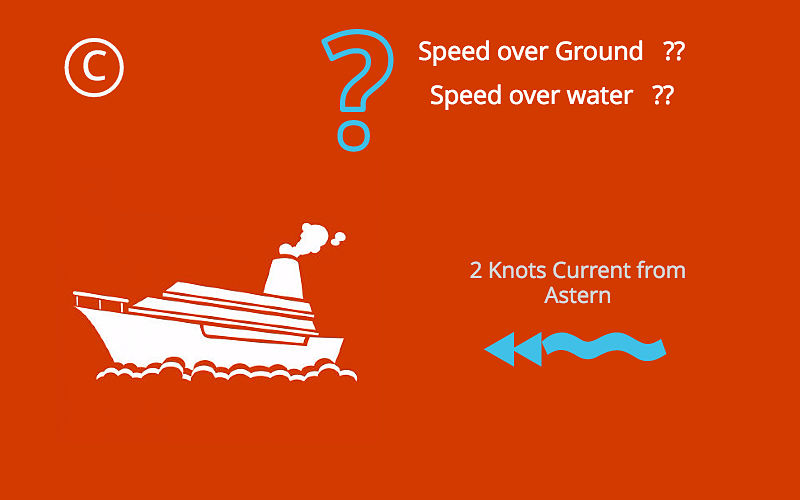
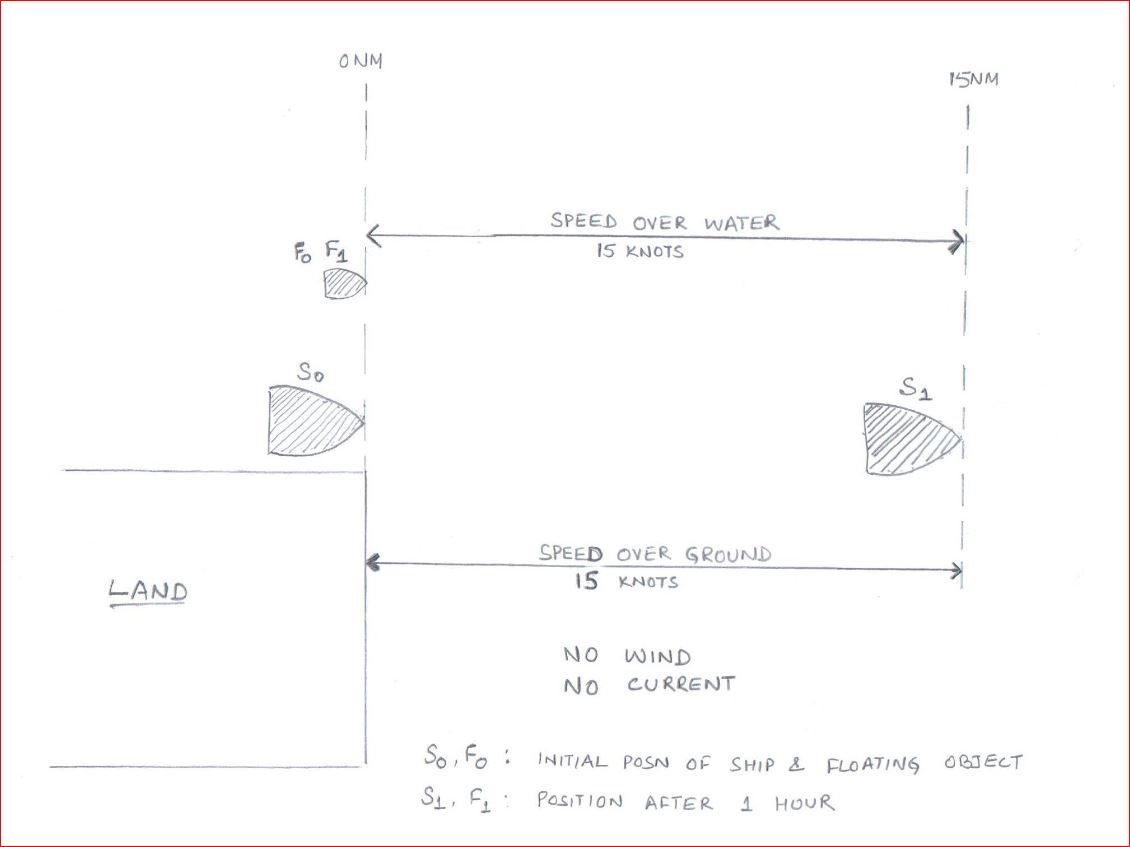

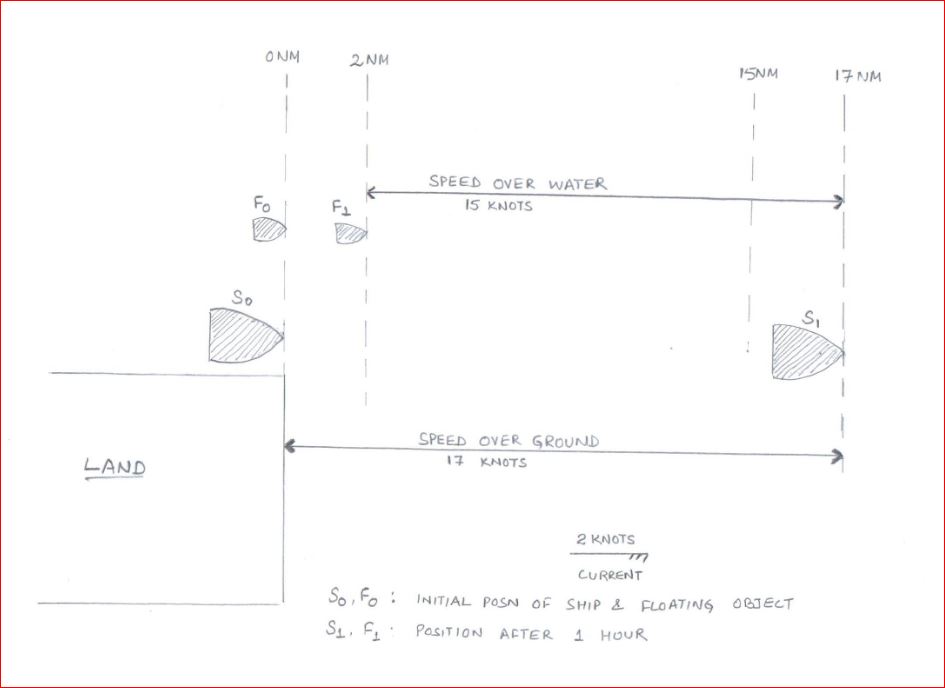
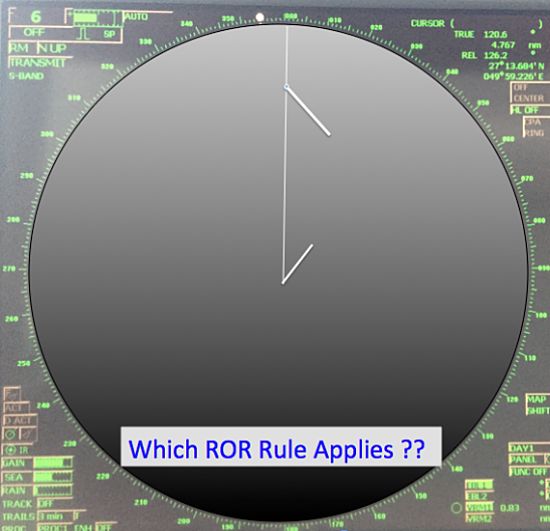

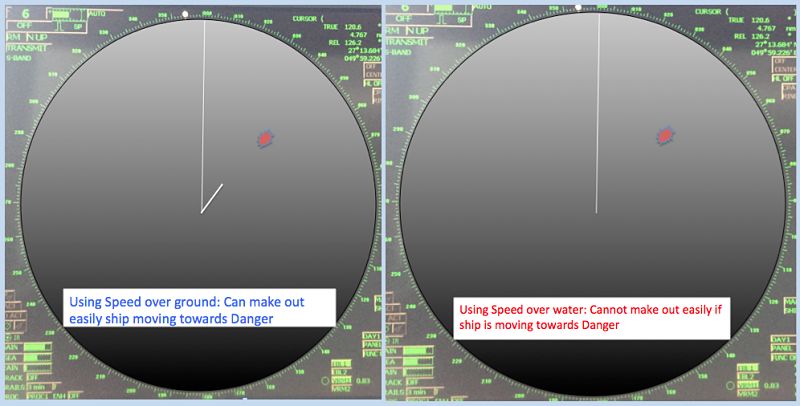
Very good explanation , only a guy whose been there can highlight the concerns of a mariner in -charge.Simple explanation.....great effort!!!!!
Glad to hear that Amit... Keep me posted on any other topic you want me to write about..
so speed over water is not affected by current????
Yes, you are right NIC..
sir , i think i want to add one simple thing that during collision avoidance speed has nothing to do with roc, only thing changes is that when we select STW, radar takes heading feed instead of cog. its nothing to do with sog or stw.this is what i had learnt. thanks
That is the most simpler way of putting it but in reality it does not take the heading. How will Doppler and radar know the heading of the other vessels ?
Sir can u explain what is speed by bottom track? Is it log speed or from GPS
speed by bottom track can be doppler log speed which is useful in waters of minimum depth. Gps will give speed over ground that is with relative to the ground similar to the speed we get when we use the gps in our mobile phone while driving.
One question. I have been running on the same RPM for couple of days now as we are slowly steaming on DSA at OPL. Log speed STW was showing around 4 knots usually and now is showing 2 knots. What could be the effect when STW is not affected with current or anything like SOG?
at anchor, 2knots currents what will be the SOG snd STW